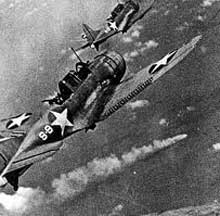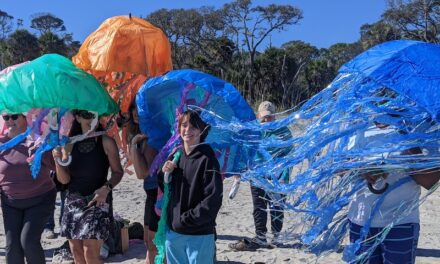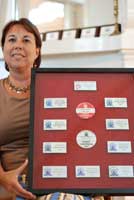
It’s been a rough month. Shortly after my glorious trip to see an old college friend in Charleston after a 40-year hiatus, I contracted a terrible stomach virus that did not seem to want to quit. Pernicious and nasty and an unpleasant way to lose weight.
Looking on the bright side, by now at least, is getting easier. I got lots of supportive calls and e-mails, some of which were brimming with advice. Keep up the fluids. Get lots of rest. Try some regular exercise. One of our “Captains of Industry” wrote to me from Ohio that “You might have inadvertently broken one of the most important rules governing senior health: (1) Never touch a Toddler, (2) Never let a Toddler touch you, and (3) Never touch a surface that has been touched by a Toddler.”
At one point my doctor had seen enough, though, and ordered me into the Emergency Room at BMH. The ER team was terrific. They admitted me almost immediately, quickly ran a series of tests and started a fluid drip to combat my dehydration. They also administered an anti-nausea drug and pain medication, the latter of which induced a not unpleasant low level haze. I felt simultaneously comforted yet vaguely anxious about being hooked up to so many tubes and having to hit the call button to have someone come help me go the bathroom.
Now like most fellows of my generation, perhaps, I have been accused from time to time of not listening as well as I could. This thought came to me in the ER and I decided to try that “zen thing” again and quietly practice listening, not a bad idea since there was nothing much else I could do besides try to follow the financial data on CNBC. There certainly were lots of sounds to process– the muted drip of the IV (was I really hearing that or just mentally filling in the blanks, I wondered), the incessant beeps including when I crooked the arm that was on the IV drip, the foot shuffles and cart movements and intermittent conversations in the hall, the TV, even the rustle of my gown. So listen I did, and vowed to continue to do so when they released me. Which fortunately turned out to be later that afternoon.
Returning home offered plenty more to listen to. Jane’s voice and laughter sounded better somehow, richer and more vibrant—especially when she called our son in Boston– though I may have missed a question or request here or there since I had camped out in the living room at some distance from where she was busy on the phone and computer in her office. There were the sounds of and around the house, too: the refrigerator and air conditioner cycling on and off, squirrels scampering across the roof, birds working the creek and feeder.
Feeling somewhat better a few days later, I was walking Dixie down our street when an F/A-18 (best I could tell) roared directly over us. I LOVE that sound normally, having picked up the habit at a spectacular Blue Angels show over Lake Michigan in the early 70’s, but this time it seemed like that fighter was ripping the sky in half at Rolling Stones concert-level volume or better. Goosebumps quickly prickled on the back of my neck and started to radiate toward my shoulders. This pilot in turn got me thinking about how lucky we all are here today to have not only first rate medical care so readily available but the finest military defending us that the planet has ever witnessed. Sounds and more sounds, some of the many wonderful sounds of freedom.
As the terrific roar from the F/A-18 slowly faded I recalled reading about the pivotal Battle of Midway in WWII. A fantastic book by Ian W. Toll, “Pacific Crucible” (2012, Norton) provides a marvelous chronicle of the lead-up to the war with Japan from both sides and a close look at our crucial victory at Midway in June 1942. One needs only the nub of an imagination to contemplate the sounds of that battle and those of our returning carrier based Navy pilots.
in WWII. A fantastic book by Ian W. Toll, “Pacific Crucible” (2012, Norton) provides a marvelous chronicle of the lead-up to the war with Japan from both sides and a close look at our crucial victory at Midway in June 1942. One needs only the nub of an imagination to contemplate the sounds of that battle and those of our returning carrier based Navy pilots.
Toll introduces us to Lieutenant Clarence Dickenson, an SBD Dauntless dive bomber pilot and executive officer of Scouting Six who flew off the aircraft carrier Enterprise. After successfully bombing the Japanese carrier Kaga with a devastating direct hit forward near the elevator, Dickenson was shot at on his return flight (“flak bursts blossomed above and below him; he dived or climbed to avoid the anticipated range corrections”) and ran out of fuel before smacking the water violently. Aboard the destroyer that pulled him out of the sea, the ever-vigilant Dickenson, thankfully also a talented diarist, tried to read through binoculars the aircraft numbers of the planes landing back on the Enterprise in an effort to determine which of his squadron mates had made it back safely. The sounds of his shipmates and the returning planes probably never left him.
Toll further helps one to practice listening in one’s mind. Returning to the Enterprise, “The aviators were hungry, sweaty and tired. They made their way down to the ‘admiral’s pantry’ for coffee and sandwiches. They spoke excitedly about what they had seen and done, and as more and more airmen came aboard, it became increasingly evident that they had dealt the Japanese fleet a devastating blow.” Sailor Alvin Kernan wrote first hand, “They were shouting and laughing as they jumped out of the cockpit, and the ship that had been so somber a moment before when the torpedo planes returned became now hysterically excited. These were heroes dressed in their khaki and green nylon flight suits, carrying pistols and knives over their yellow Mae Wests, and describing with quick hands and excited voices how they had gone into their dives, released their bombs, and seen the Japanese flight decks open up in flames just below them.” Kernan was no average enlisted man. He fought in many naval battles, wrote “Crossing the Line: A Bluejacket’s Odyssey During World War II” and became Provost of Yale University and Dean of the Graduate School at Princeton. Yes, this was some amazing generation of ours and we owe them everything we cherish about our lives in a free society.
The excited celebratory banter of our victorious pilots and their shipmates, the gargantuan roar of a modern combat aircraft, and over in the hospital, the perhaps barely audible sound of a vital IV drip or a conversation in the hall. Sounds that make you think of your freedom, sounds that say you’re alive.






